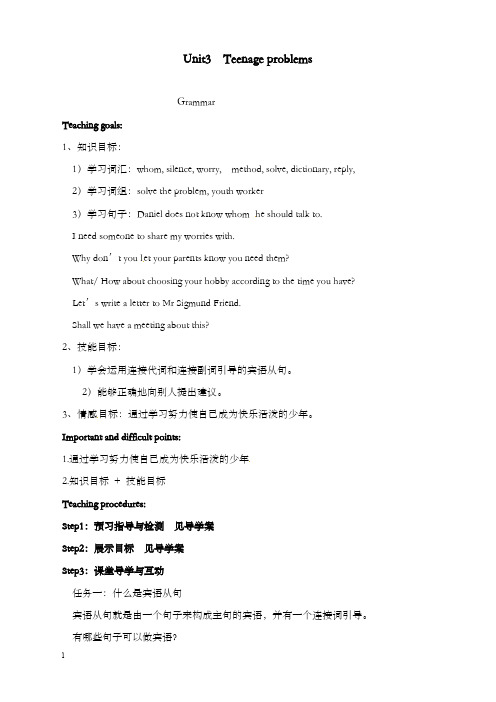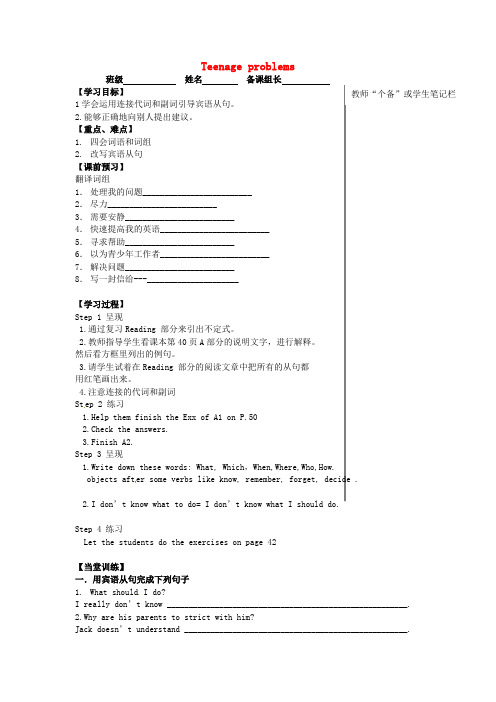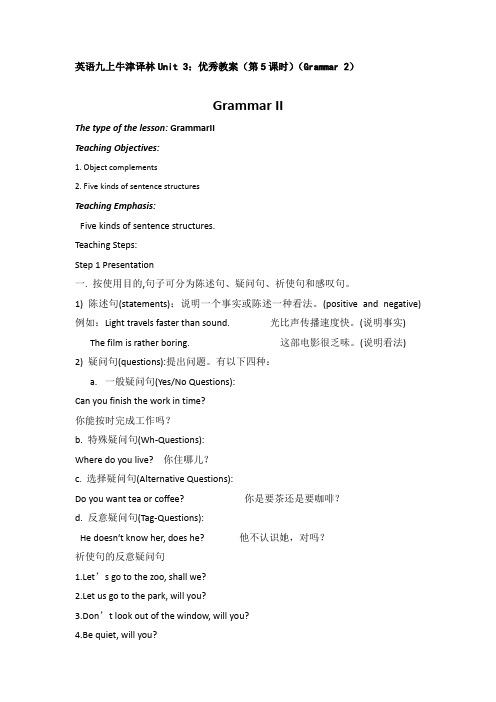江苏省句容市二圣中学牛津译林版九年级英语上册Unit3 Grammar 学案
- 格式:doc
- 大小:49.50 KB
- 文档页数:7

牛津译林版英语九上Unit 3《Teenage problems》(Grammar)教学设计一. 教材分析《牛津译林版英语九上Unit 3 Teenage problems》主要讨论青少年时期可能遇到的各种问题,如学习压力、与父母沟通、健康饮食等。
本单元通过不同的话题帮助学生了解青少年阶段可能面临的挑战,并学会用英语表达这些问题。
单元中包含了大量的词汇和表达方式,以及一些复杂的语法结构,如现在分词作状语等。
二. 学情分析九年级的学生已经具备了一定的英语基础,能够理解和运用一些基本的英语表达方式和语法结构。
然而,对于一些复杂的语法结构和词汇,他们可能还需要进一步的引导和帮助。
此外,由于青少年阶段本身就是充满挑战和变化的,学生应该能将自己的人生经验和所学内容联系起来,提高他们的学习兴趣和参与度。
三. 教学目标1.学生能够掌握本单元中的重点词汇和表达方式,如“pressure”,“communicate”, “healthy eating”等。
2.学生能够正确运用现在分词作状语等语法结构。
3.学生能够用英语讨论青少年时期可能遇到的问题,并给出相应的建议。
四. 教学重难点1.重点:本单元的重点词汇和表达方式,以及现在分词作状语的语法结构。
2.难点:如何正确运用现在分词作状语,以及如何在讨论中运用所学词汇和表达方式。
五. 教学方法1.任务型教学法:通过不同的任务和活动,让学生在实际的语言环境中学习和运用英语。
2.合作学习:鼓励学生之间的合作和交流,提高他们的语言表达能力和团队合作能力。
3.引导式教学法:教师引导学生通过观察、思考和讨论,发现和理解语言规律。
六. 教学准备1.教材:牛津译林版英语九上Unit 3 Teenage problems。
2.多媒体教学设备:用于展示PPT和视频材料。
3.教学素材:与本单元主题相关的图片、视频等。
七. 教学过程1.导入(5分钟)通过提问方式引导学生谈论他们所知道的青少年时期的问题,激发学生的兴趣和参与度。

Unit3 Teenage problemsGrammarTeaching goals:1、知识目标:1)学习词汇:whom, silence, worry, method, solve, dictionary, reply, 2)学习词组:solve the problem, youth worker3)学习句子:Daniel does not know whom he should talk to.I need someone to share my worries with.Why don’t you let your parents know you need them?What/ How about choosing your hobby according to the time you have? Let’s write a letter to Mr Sigmund Friend.Shall we have a meeting about this?2、技能目标:1)学会运用连接代词和连接副词引导的宾语从句。
2)能够正确地向别人提出建议。
3、情感目标:通过学习努力使自己成为快乐活泼的少年。
Important and difficult points:1.通过学习努力使自己成为快乐活泼的少年2.知识目标+ 技能目标Teaching procedures:Step1:预习指导与检测见导学案Step2:展示目标见导学案Step3:课堂导学与互动任务一:什么是宾语从句宾语从句就是由一个句子来构成主句的宾语,并有一个连接词引导。
有哪些句子可以做宾语?一、连词(引导词)1. 当宾语从句是陈述句时(包括肯定句和否定句),连词由that引导,因为that 在从句中不作任何成分,也没有任何具体意思,因此在口语或非正式文体中常省略Lin Tao feels (that) his own team is even better.She says (that) she won’t take part in the sports meetingnext Sunday.Jim thought (that) the train was like a big moving party.He said (that) he would like to see the headmaster.在主句为动词be加某些形容词(如sorry, sure, afraid, glad等)作表语时,后面所跟的省略that的从句也可算是宾语从句I’m s orry (that)I don’t know .We’re sure (that) our team will win .I’m afraid (that) he won’t pass the exam .2. 一般疑问句做宾语宾语从句必须用________(陈述句结构叫陈述语序; 疑问句结构叫疑问语序)由if或whether引导的宾语从句。

Unit 3 Teenage problemsGrammar设计说明教学反思首先通过复习Simon的问题引入新课,用问句呈现Simon的问题,然后呈现出由疑问词引导的宾语从句,通过一系列的讲解和练习,让学生掌握宾语从句的用法。
针对学生们的青少年问题给出建议,总结提建议的句型,学会用宾语从句和提建议来表达自己的想法。
教学目标通过本课时的教学,让学生达成以下目标:1.知识目标掌握单词和短语: whom, silence, worry, method, solve, dictionary, youthworker, reply。
掌握疑问词引导的宾语从句和提建议的句型。
2.能力目标掌握宾语从句的用法,用宾语从句和提建议来表达思想,培养写作能力。
3.情感目标通过阅读,让学生了解青少年问题,并学会积极解决问题,培养良好的个人品质,健康成长。
重点难点重点:疑问词引导的宾语从句以及提建议的句型。
难点:宾语从句。
教学准备PPT 课件;相关图片。
授课时数1课时教学过程Step 1 Lead-in1. Revise Simon’s problems.2. Ask: What does Simon wonder? What can’t he understand?Present the sentences. And lead in today’s class.Simon wonders how he can achieve a balance between his schoolwork and hishobbies.Simon can’t understand why his parents are so strict with him.Step 2 Grammar A1. Show students some sentences. Explain the usage of the object clauses.We use a question word to introduce an object clause that expresses a wh-question. The word order in the clause should be the same as that in a statement.(1) I wonder what I should do.(2) Daniel does not know whom he should talk to.(3) Sometimes we forget when we should stop.(4) I do not understand why they are so strict with me.(5) I do not know how I should deal with the problem.2. Do Grammar A1. Complete each object clause with a correct question word. Then read and understand each sentence.Answers: 1 where 2 who/whom 3 why 4 when 5 how 6 what3. Do Grammar A2.Answers: 2 how much sleep we need every day3 which method I should use to solve the problem4 where we can buy a good dictionary5 how I can improve my English quickly6 whom we should ask for help7 what life would be like without hobbies4. Do Grammar A3.Answers: (1) whom/who (2) what/who (3) what (4) how (5) what5. Give them a summary of the object clauses.6.语法训练单项选择。

Teenage problems班级姓名备课组长1学会运用连接代词和副词引导宾语从句。
2.能够正确地向别人提出建议。
【重点、难点】1.四会词语和词组2.改写宾语从句【课前预习】翻译词组1.处理我的问题_________________________2.尽力_________________________3.需要安静_________________________4.快速提高我的英语_________________________5.寻求帮助_________________________6.以为青少年工作者_________________________7.解决问题_________________________8.写一封信给---_____________________【学习过程】Step 1 呈现1.通过复习Reading 部分来引出不定式。
2.教师指导学生看课本第40页A部分的说明文字,进行解释。
然后看方框里列出的例句。
3.请学生试着在Reading 部分的阅读文章中把所有的从句都用红笔画出来。
4.注意连接的代词和副词St ep 2 练习1.Help them finish the Exx of A1 on P.502.Check the answers.3.Finish A2.Step 3 呈现1.Write down these words: What, Which,When,Where,Who,How.objects aft2.I don’t know what to do= I don’Step 4 练习Let the students do the exercises on page 42【当堂训练】一.用宾语从句完成下列句子1.What should I do?I really don’t know _______________________________________________________.2.Why are his parents to strict with him?Jack doesn’t understand ___________________________________________________.3.Whom should we ask for help?We wonder______________________________________________________________.4.Which club shall I join next term?I am not sure____________________________________________________________.5.When should he stop?Sometimes he forgets _____________________________________________________.6. How can she get to the museum?Kitty is wondering ___________________________________________________.二..用合适的连词完成句子1.He doesn’t know ______ to get there. I think he can take a bus.2.He doesn’t know _______ to buy a good camera. I think he can get one in Su Ning.3.She doesn’t know ______ to hand in the homework. I think she may do it tomorrow.4.There are different kinds of sports shoes. I can’t decide _______ to buy.5.He doesn’t know _______ to ask for help. I think he can call 110.6.He doesn’t know _______ to ask for help. I think he may talk to Sigmund Friend.7.The bus is full of people. I don’t know _____ to stand.8.Tom can’t find _______ to play with.9.I don’t feel hungry a t all. I don’t know ______to eat.10.People cut down many trees every year, the birds can’t find ______ to live.【课后提升】一.用所给词的正确形式填空1.She often has difficul ty expressing ______________(she).2.We felt strange about his ____________(silent) at the party as he used to bevery outgoing.3.Zhang Hua is a _________(care) girl. She often makes mistakes in her daily life.4.As a student, we should shar e our __________(worry) with our friends or ourteachers.5.You’d better go to bed _________(early) today than ___________(usually).6. I can’t eat it a lone. I would rather (take )it home ____(share) it with my little sister.7. Ask him to do what he can (help) us.8. Mr Sigmund Friend, a ____________(young) worker, can give you some good advice. 二.根据中文提示和句义写出单词1.Never keep your _________(担心) to yourself. It’s bad for your mind and body.2.After a long walk, his grandmother felt _________(疲劳).3.All the boys _________(解决) that Maths problem a moment ago.4.By________(谁) were X-ray machines invented many years ago?5.Mr Jiang is one of the _______________(严厉的) teachers in our school.6.There are al l kinds of __________(字典) on that shelf.7.I didn’t get my parents’ __________(答复) at all last Sunday.8.Have you tried that new ___________(方法) yet?9.His little sister doesn’t know how she can ________(提高) her English.10.At that time, we could hear the sound of _________(寂静) in the forest.三选择题( )1.What a nice paper plane! Can you show us ________ you make it?A. whetherB. howC. whyD. what( )2. Do you know _______i saw yes terday? It was my favorite star, Jackie!A. whomB. whenC. whereD. how( )3. –Could you tell me how long_______?—For two weeks.A. have you borrowed this bookB. you have borrowed this bookC. you have kept this bookD. have you kept this book( )4.—I feel stressed from time to time. Could you give me some advice?--_______ sharing your worries with your parents?A. Why don’t youB. How aboutC. Why notD. Would you like( )5. –Do you know _______ the girl in blue is ? –Maybe a doc tor.A. whoseB. howC. whatD. which( )6. He always gives me useful advice when I don’t know_______.A. who to talkB. who to talk toC. who will I talk toD. who should I talk to四.翻译句子1. 我的父母总是很忙。


英语九上牛津译林Unit 3:优秀教案(第5课时)(Grammar 2)Grammar IIThe type of the lesson: GrammarIITeaching Objectives:1. Object complements2. Five kinds of sentence structuresTeaching Emphasis:Five kinds of sentence structures.Teaching Steps:Step 1 Presentation一. 按使用目的,句子可分为陈述句、疑问句、祈使句和感叹句。
1) 陈述句(statements):说明一个事实或陈述一种看法。
(positive and negative) 例如:Light travels faster than sound.光比声传播速度快。
(说明事实) The film is rather boring.这部电影很乏味。
(说明看法)2) 疑问句(questions):提出问题。
有以下四种:a.一般疑问句(Yes/No Questions):Can you finish the work in time?你能按时完成工作吗?b. 特殊疑问句(Wh-Questions):Where do you live?你住哪儿?c. 选择疑问句(Alternative Questions):Do you want tea or coffee? 你是要茶还是要咖啡?d. 反意疑问句(Tag-Questions):He doesn‘t know her, does he? 他不认识她,对吗?祈使句的反意疑问句1.Let’s go to the zoo, shall we?2.Let us go to the park, will you?3.Don’t look out of the window, will you?4.Be quiet, will you?3) 祈使句(Imperative Sentences): 提出请求,建议或发出命令。
课题Unit 3 Teenage problems Grammar A 课型New教学设计授课时间月日总第课时目标要求1. To use object clauses introduced by “wh-“words.2. To know that the word order in the object clause should be the same as that in a statement.学习重点To use object clauses introduced by “wh-“words.学习难点To know that the word order should be the same as that in a statement.教法教具Presentation practice/ Small blackboards.教学过程学习内容个人设计Step 1 Lead-inReview object clauses introduced by “if or whether” and “that”.Explain that these clauses relate to “yes/no” questions.Step2 PresentationTell students that when object clauses relate to “wh-“questions,we should use “wh-“words to introduce object clauses. Askstudents to read the grammar rules and the two examples at the top.Remind them that the clauses should be introduced by “wh-“wordsand the word order in the clause should be the same as in thestatements.e.g: The robot no longer knew.When should it cook breakfast.→The robot no long er knew when it should cook breakfast.Write the following sentences on the blackboard and encouragestudents to use the following structures:⑴I am not sure…⑵I’d like to know…⑶I can’t imagine…⑷Can you tell me…?①where is Zhongshan Park?②How did you go to school?③What will you do next Sunday?④When was the parcel delivered?⑤Who called in the morning?St Sep3 PracticeAsk students to do the exercise on page 29. Students will be ableto complete it on their own. Check the answers as a class.Step4 HomeworkFinish the exercises in the workbook.板书设计。
牛津译林版九年级上册Unit 3《Teenage problems》(Grammar)教学设计一. 教材分析《牛津译林版九年级上册Unit 3 Teenage problems》主要讨论了青少年时期可能遇到的各种问题,如家庭、学校、朋友以及自我认知等方面。
通过本节课的学习,学生能够掌握一般现在时态的被动语态,以及如何运用一般现在时态进行问题描述。
教材内容贴近学生生活,有利于激发学生的学习兴趣和积极性。
二. 学情分析九年级的学生已经具备一定的英语基础,能够运用一般现在时态进行简单描述。
但部分学生在语法方面仍存在一定的困难,如对一般现在时态的被动语态掌握不扎实。
此外,学生对青少年时期的问题有一定的了解,但可能缺乏对这些问题深度思考和讨论的机会。
三. 教学目标1.知识目标:–能熟练运用一般现在时态的被动语态进行描述。
–掌握与青少年问题相关的词汇和短语。
2.能力目标:–能用英语描述和讨论青少年时期的问题。
–提高学生的团队合作和沟通能力。
3.情感目标:–培养学生对青少年问题的关注和理解。
–引导学生正确面对和处理青少年时期的问题。
四. 教学重难点•一般现在时态的被动语态。
•与青少年问题相关的词汇和短语。
•一般现在时态的被动语态在实际语境中的运用。
•如何在讨论中正确表达自己的观点和情感。
五. 教学方法1.情境教学法:通过设定情境,让学生在实际语境中运用所学知识。
2.任务型教学法:通过完成各种任务,提高学生的实际运用能力。
3.合作学习法:鼓励学生分组讨论,培养团队合作精神。
六. 教学准备1.教学PPT:包括教材内容、语法点讲解、练习题等。
2.教学素材:与青少年问题相关的图片、视频等。
3.分组名单:便于学生进行合作学习。
七. 教学过程1.导入(5分钟)–利用与青少年问题相关的图片或视频,激发学生的兴趣。
–引导学生用英语自由谈论青少年时期遇到的问题。
2.呈现(10分钟)–介绍一般现在时态的被动语态的用法。
–通过例句和练习,让学生掌握一般现在时态的被动语态。
英语九上牛津译林Unit 3:优秀教案(第4课时)(Grammar 1)Grammar IThe type of the lesson: GrammarTeaching Objectives:1.To use “wh-” words + “to” infinitives to talk about problems.2.带to的动词不定式可以被放在句子中不同的部分Teaching Emphasis:1 ‘To’-infinitive2 Wh- words3 what to do/where to ask/how to solve/when to meet/which to meet/ which to do Teaching steps:Step 1 GreetingStep 2 Presentation带to的动词不定式可以被放在句子中不同的部分。
一、作主语。
It is good to hand in homework on time.= To hand in homework on time is good.To plant trees every year is necessary.= It is necessary to plant trees every year.二、作谓语。
My dream is to be a great football player.My purpose is to help you solve your problem.三、作宾语。
I hope to hear from you soon.The boy promises not to be late for school again.四、作宾语补语。
My parents do not allow me to go out after 6 p.m.Mr. Wu tells the students not to shout in class.五、作表语。
Unit3 Grammar课型:新授总第16学时【学习重、难点】1学会运用连接代词和连接副词引导宾语从句。
2能够正确地向别人提出建议【学习过程】课前预习一、认真预习P40-42, 完成下列句子:1.Does Mr.Brown enjoy living in China?Could you tell us?(改写句子)Could you tell us _________ Mr.Brown _________ living in China?2.“Does the g irl need any help?”he asked me.(变为复合句)He asked me _________ the girl _________ any help.3. How many colours are there in a rainbow?I want to know.(改为含宾语从句的复合句)I want to know _________ _________colours ________ ________ in a rainbow.4. I knew it the age of 7. The Earth goes around the Sun.(合并为一句)_________________________________________________________二、短语翻译:1.be strict with sb. in sth_____________2.how to deal with..../what to do with....______________3.need silence/quietness_______________4.have difficulty expressing myself_______________5.life without hobbies________________6.a youth worker_________________词汇、短语课堂学习Step1 Grammar A: wh-word引导的宾语从句。
1、选用所给词填空.( that , whether, what, how, which, when, if)1)I wonder _____ we’ll leave for Shanghai.2)Did she tell you ____ floor she lived on?3)Please go and find out ___ soon the plane will take off.4)She asked me ____ I would go with her or not.5)Do you know _____ day it is today?6)He said ___ he missed us very much.2. Look and say.3. Sum up特殊疑问句变宾语从句五注意。
1. 在引导词上, 要将疑问代词或疑问副词变为连接代词或连接副词, 引导宾语从句。
2. 宾语从句的时态应与主句的时态保持一致。
3. 在语序上, 要将疑问句语序改为陈述句语序。
4. 特殊疑问词在句中作主语, 变为宾语从句时语序不变(时态应作相应变化)。
5. 特殊疑问句变为宾语从句后, 用问号还是用句号完全取决于主句的句式:如主句为陈述句、祈使句, 句末就用句号; 如主句是疑问句, 句末就用问号。
2..选择()1.I don't know ________ he will come tomorrow._________ he comes,I'll tell you.A.if;Whether B.whether;Whether C.if;That D.if;If()2.I don't know _________ the day after tomorrow.A.when does he come B.how will he come C.if he comes D.whether he'll come()3.Could you tell me _________ the nearest hospital is?A.what B.how C.whether D.where()4.Could you tell me _________ the radio without any help?A.how did he mend B.what did he mendC.how he mended D.what he mended()5.I want to know _________ .A.whom is she looking after B.whom she is lookingC.whom is she looking D.whom she is looking after( ) 6. He doesn’t know _____ he should do with the broken computer.A. howB. whatC. whyD. who( ) 7. You are tired. Why not ________________?A. have a restB. having a restC. to have a restD.has a rest( ) 8. We have been to Mount Tai. How about ______________ to the Yellow Mountains?A. goB.goingC. to goD.went( ) 9. Let’s ___________ a discussion about it.A. haveB. havingC. hasD. to have( ) 10.Do you know where _________ now?A.he lives B.does he live C.he lived D.did he live( ) 11.Do you know what time _________ ?A.the train leave B.does the train leaveC.will the train leave D.the train leaves( ) 12.—I don’t know if his uncle ____. ---I think he ____ if it doesn’t rain.A.will come, comesB.will come, will comees, comeses, will come( ) 13. The teacher was very happy ____ his students.A. withB. atC. inD. to( ) 14. Ten years _____ a long time.A. isB. areC. wasD. were( ) 15. The smartphone(智能手机) is ____ dear. I don’t have _____ money.A. too much, too muchB. much too, much tooC. too much, much tooD. much too, too much( ) 16.I don't know _________ .Can you tell me,please?A.how the two players are old B.how old are the two playersC.the two players are how old D.how old the two players areStep2 Grammar B: Giving suggestionsA . Explanations:1. Why not…? / Why don’t you …?这两种句型结构常用于说话人向对方提出一个建议,意思是“为什么不……?”Why not…?/ Why don’t you …? 后面必须跟动词原形。
2 What /How about...?这两种句型结构常用于说话人向对方提出一个建议,意思是“……怎么样?”What /How about...后接名词/代词或动名词?3. Let’s.... & Shall we...?这两种句型结构也常用于说话人向对方提出一个建议,意思是“我们做……吧/好吗?”后接动词原形。
B. Group work: Make some sentenses to give suggestions.Step3 Exercise按要求完成句子:1.What about listening to music ?(改为同义句)_________ __________ listening to music ?2.We will go to the park together.(用shall改写句子)__________ _______ go to the park together ?3.Why don’t you make a birthday card for his birthday ? (改为同义句)_________ ________ make a birthday card for his birthday ?4.Let’s go to climb the Maoshan Mountains this weekend.(改为否定句)Let’s _______ _______ to climb the Maoshan Mountains this weekend.宾语从句的语序和时态:1. 语序:无论主句是陈述句还是疑问句,宾语从句都必须使用,即“主句+连词+宾语从句(主语+谓语+……)”句式。
Do you know how many colours in a rainbow?(there are ; are there)Could you tell me what do with the money ?(should I; I should)2.时态:含宾语从句的复合句,主、从句谓语动词的时态呼应应包括以下三点内容:1)如果主句的谓语动词是一般现在时,从句的谓语动词可根据需要,选用相应的任何时态。
如:I don't know when he (come)back tomorrow.我不知道明天他将何时回来。